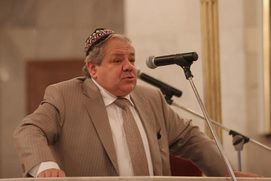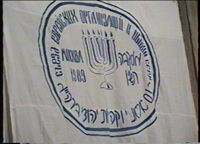|
Euroasian Jewish News

President of the Vaad, EAJC Secretary General Michael Chlenov
|
Convention of the VAAD Russia and round-table “Twenty Years After”
25.11.2009
On the morning of December 2, on the premises of the Moscow theater “Shalom,” a congress of one of the founders of the Euro-Asian Jewish Congress (EAJC), the Federation of Jewish Organizations and Communities (Vaad Russia) will take place. The President of the Vaad is the EAJC Secretary General Professor Michael Chlenov. The congress has been timed to the 20th anniversary of the First Founding Congress of Vaad USSR, a momentous event, which can be assumed to be the beginning point of the rebirth of Jewish community life on one-sixth of the dry land of the world. EAJC leaders, such as Michael Chlenov and the Chairman of the Vaad Ukraine, EAJC General Council Chairman Josef Zisels were at the roots of the recreation of independent Jewish community structures in the Soviet Union. In December 1989, in Moscow at the Movie Center at Presnya, the first congress of Soviet Union Jews took place. This congress announced the creation of the first all-Soviet Jewish social organizations, which was given the name “Vaad,” which means “council” or “committee.” This name was given in memory of the vaads which ruled Jewish life and relations of the Jews with the leadership of the Rech Pospolitaya in XVI–XVIII вв.
It was Vaad which took upon itself the task of creating the first Jewish communities during the final years of Soviet power. Vaad allowed the transition from the so-called “refusalist” independent Jewish movement of the 1960–1980s to a new, unfamiliar for Soviet Jews – and not only Jews – life in the conditions of legality. The Vaad USSR stopped its existence soon after the Soviet Union fell apart. The function of connecting new Jewish communities in the new post-Soviet countries was taken up by the Euro-Asian Jewish Congress (EAJC). And in 1992 Russia, an organization which was heir to the Vaad USSR appeared – the Vaad Russia. It united the numerous Jewish communities which aimed to support and restore the Jewish national self – the culture, education, and language. In the middle of the 1990's, new forces came out onto the arena of Jewish community life: the Jewish businessmen who had by then strengthened their position, a kind of Jewish “new Russians,” as they were called then, and also religious unions, among which the Lyubatich Hasidim showed themselves strongest.
The Vaad stopped being the only structure to unite the already-numerous Jewish organizations. A similar story happened to the Vaad Ukraine, which came into being during the same year of 1992, and which is headed by the EAJC General Council Chairman Josef Zisels.
The delegates of Vaad Russia from approximately 50 regions of the country are to discuss the current role of Vaad and its relations to other parts of the Jewish community of Russia. The focus of the discussion will be on the concept of the Vaad as an element of Russian civil society, as a venue for the national existence of the Jewish minority in the Russian Federation. The congress is to adopt a new statute and to elect a new leader for the organization. For now, Professor Michael Chlenov has served from 1992 without breach of continuity as president of this Union.
The congress is titled as a jubilee, and the twentieth anniversary of the first Vaad congress, a momentous event in the post-Soviet history of Soviet Jewry, must not pass unnoticed. The Round Table “Twenty Years After. Jewish Communities of the Post-Soviet Territory: Problems and Future Challenges,” which will not only be attended by the delegates of the Russian congress, but by many of the participants of those events that took place twenty years ago, including the former leaders of the Vaad USSR, which currently reside in Israel. But the round table has been conceived in such a manner so it does not become just a meeting of community elders. Its topic is to analyze the challenges which stand before Russian-speaking Jewry in the years soon to come. There are many, and many of them have initiated serious concern. Three views are to be represented – from Moscow (M. Chlenov), from Kiev (J. Zisels), and from Jerusalem (Dr. Zeev Hanin). The discussion will then examine particular aspects of Jewish life on post-Soviet territory, and in the Russian-speaking Jewish Diaspora. delegates of the Russian congress, but by many of the participants of those events that took place twenty years ago, including the former leaders of the Vaad USSR, which currently reside in Israel. But the round table has been conceived in such a manner so it does not become just a meeting of community elders. Its topic is to analyze the challenges which stand before Russian-speaking Jewry in the years soon to come. There are many, and many of them have initiated serious concern. Three views are to be represented – from Moscow (M. Chlenov), from Kiev (J. Zisels), and from Jerusalem (Dr. Zeev Hanin). The discussion will then examine particular aspects of Jewish life on post-Soviet territory, and in the Russian-speaking Jewish Diaspora.
Photo below: banner of the First Congress of Jewish Organizations of the USSR (Founding Convention of the Vaad USSR, 1989.
|
|
